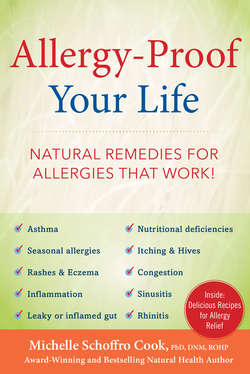Читать книгу Allergy-Proof Your Life - Michelle Schoffro Cook - Страница 14
На сайте Литреса книга снята с продажи.
Antihistamine Drugs
ОглавлениеAntihistamine drugs block histamine receptors in the body, thereby reducing the symptoms of allergies. Released by part of the body’s immune system known as mast cells, histamine is a naturally occurring substance in the body that causes blood vessels to dilate. In an allergic reaction, the immune system becomes hyperactive and overreacts to common, everyday substances such as pollens, molds, dust, animal dander, and so forth. When histamine is excessively released, it results in a runny nose, watery eyes, tissue swelling, and a constriction of the passageways of the lungs. Antihistamine drugs block receptors in the body so the histamine has less of an effect. Taken as eye drops, liquids, pills, and nasal sprays, antihistamines are largely OTC treatments used to diminish symptoms such as itchy eyes and nasal congestion. Although they can reduce symptoms, they do not address the causes of allergies.
Some of the most common antihistamine drugs include Allegra (fexofenadine), Benadryl (diphenhydramine), Zyrtec (cetirizine), and Claritin (loratadine); however, there are dozens of antihistamine drugs on the market.
Allegra (fexofenadine). Fexofenadine is an antihistamine that is often used to treat sneezing, runny nose, itching, and watery eyes. The most common side effects include headaches, earaches, vomiting, back pain, body aches, chills, coughing, diarrhea, dizziness, fevers, joint pain, muscle aches, nasal congestion, painful menstruation, runny or stuffy nose, sleepiness, sneezing, sore throat, and weakness.2 You may notice that the drug can cause some of the same symptoms it is used to treat. You should not drive a vehicle or operate heavy machinery while using this drug, as it can cause drowsiness or dizziness and increase the risk of injury. Avoid alcohol while taking this medication. Fexofenadine should not be combined with the herb St. John’s wort, as the herb increases blood levels of the drug. Conversely, ingestion of apple juice, grapefruit juice, or orange juice can decrease the blood levels of the drug, reducing its effectiveness.3
Benadryl (diphenhydramine). Also known by the names of Benylin, Tylenol Allergy Sinus, Tylenol Flu, Excedrin PM, and other brand names, diphenhydramine is primarily used to reduce the symptoms of sneezing, runny nose, itching, and watery eyes as well as to reduce swelling associated with allergic skin reactions. Although it is available on its own, it is also frequently combined with other drugs to address colds, flus, and other respiratory infections. Some of the side effects can include sedation, sleepiness, dizziness, loss of coordination, thickening of respiratory mucous secretions, depression, impaired motor skills, confusion, neck stiffness, difficulty swallowing, dementia, rash, eczema, nausea, tachycardia (quickening of the heart beat), heart palpitations, reduced blood pressure, anemia, and gastrointestinal (GI) upset.4 You should not drive a vehicle or operate heavy machinery while using this drug, as it can cause drowsiness or dizziness and increase the risk of injury. Avoid alcohol while taking this medication, as it can significantly increase the drowsiness caused by the drug. This drug interacts with many other drugs, so you should consult your pharmacist if you’re taking other medications. I’m unaware of any drug-herb interactions with diphenhydramine, but in theory, the drug may interact with the herb henbane (Hyoscyamus niger).5 Because the herb can be toxic, it should only be used by a skilled herbalist, if at all, so it is not found in most herbal formulations.
Claritin (loratadine). Used to reduce the effects of histamine in the body, Claritin primarily reduces symptoms of sneezing, itching, watery eyes, runny nose, hives, or skin rashes. Some of the side effects can include headaches, fatigue, dry mouth, insomnia, nervousness, dizziness, abdominal pain, eye inflammation, flu-like symptoms, stomachache, earache, viral infection, impaired motor skills, and heart arrhythmias.6 Because food can slow the absorption of the drug, it is usually recommended to take the drug on an empty stomach. Like other antihistamines, loratadine may cause drowsiness or dizziness. Avoid alcohol while taking this medication, as it can increase the drowsiness caused by the drug.7
Zyrtec (cetirizine). Like other antihistamines, cetirizine is used to alleviate the symptoms of sneezing, runny nose, itching, watery eyes, and hives. Some of the side effects of this drug can include drowsiness, fatigue, dry mouth, insomnia, headache, abdominal pain, irritability, nervousness, aggressive reactions, convulsions, nausea, vomiting, bronchitis, sinusitis, and asthma.8 You may notice that the drug can cause some of the same symptoms it is used to treat. Avoid alcohol while taking this medication.9
